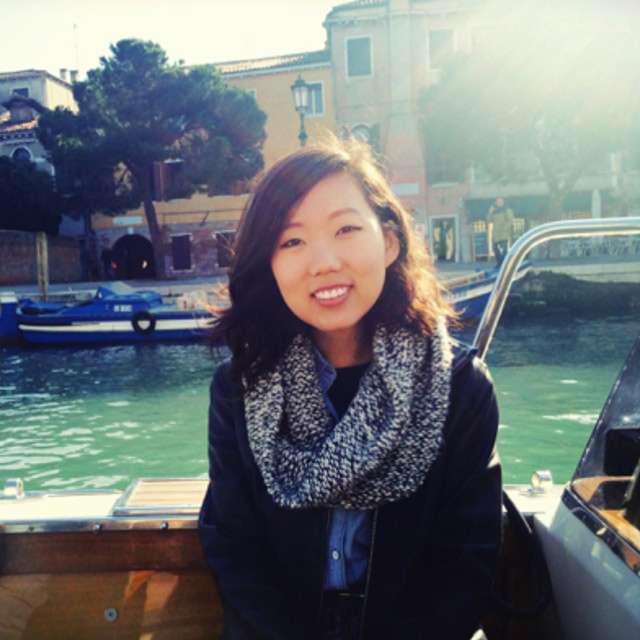
Victoria Chung
Chemistry Teacher to Medical Student: My journey to becoming a medical evangelist
As usual, Daisy had conspicuously avoided the empty desks next to other students and had taken a seat, alone, at the back lab table.
“Fantastic show last night,” I said with a wink as I pulled up a chair. “You blew me away as Vivian.”
Daisy couldn’t hide the smile that crept across her face. “You came?”
“Later you have to tell me how you practiced that accent. But for right now, can you pull out your packet for me? How are you feeling on calculating moles?”
We worked through a few examples together until Daisy was able to deftly navigate through dimensional analysis conversions on her own.
When class ended, Daisy lingered and, before heading out the door, she nervously secured a blonde strand behind her ear and said with a shy glance, “Thanks, Ms. Chung.”
 I smiled back, simultaneously fulfilled and heartbroken. While it felt incredible to brighten Daisy’s day, I was also reminded of all the things I couldn’t address. Daisy’s Individualized Education Plan detailed her adolescent depression, anxiety disorder, ADHD, and bulimia. In the public school classroom, these issues are considered relevant only as it pertains to the student’s learning. As a chemistry teacher, I could make accommodations, like offering more one-on-one time and graphic organizers, but I wasn’t qualified to treat her mental illnesses. Most importantly, I was limited in my capacity to point her to the true source of healing.
I smiled back, simultaneously fulfilled and heartbroken. While it felt incredible to brighten Daisy’s day, I was also reminded of all the things I couldn’t address. Daisy’s Individualized Education Plan detailed her adolescent depression, anxiety disorder, ADHD, and bulimia. In the public school classroom, these issues are considered relevant only as it pertains to the student’s learning. As a chemistry teacher, I could make accommodations, like offering more one-on-one time and graphic organizers, but I wasn’t qualified to treat her mental illnesses. Most importantly, I was limited in my capacity to point her to the true source of healing.
I started working in public schools because I saw a need for dedicated, Christ-centered teachers to work with students often neglected by the system. However, I felt something was missing. Even if I was the best teacher my students ever had, I fell so short of healing them of their deepest anxieties and brokenness. Only Christ could do that. I was beginning to realize that my work in public schools did not allow me to share Him as explicitly as I wanted to. Although initially wary of medicine (for what I preemptively judged as superficial, pill-pushing physician-patient encounters), I began praying for direction as I tentatively started exploring the medical field.
Yet it was during my volunteering at a leprosy colony in China that God fully opened my mind and heart to the transformational power of medical evangelism, not only to transform other people’s hearts, but also my own.
One evening I tried feeding Lei Popo another bite of minced chicken and chopped rice. But she sighed and turned her head away. That morning she had cried out that she wanted to die. She was tired of being blind, dependent, lonely, and in perpetual pain. With the language barrier between us, and the permanence of her condition, I felt even more limited in my capacity to help than when teaching students like Daisy. My complete inability to do anything to alleviate the sorrows of her heart brought me to search God’s Word and seek His wisdom and strength to compensate for the lack of my own.
I was directed to this quote that changed my perspective on medicine and, indeed, my life. This was the very kind of work I was seeking!
“It should ever be kept before them that their work is not only to relieve physical suffering, but to minister to souls that are ready to perish. It is important that everyone who is to act as a medical missionary be skilled in ministering to the soul as well as to the body. He is to be an imitator of Christ, presenting to the sick and suffering the preciousness of pure and undefiled religion. While doing all in his power to relieve physical distress and to preserve this mortal life, he should point to the mercy and the love of Jesus, the great Physician, who came that “whosoever believeth in him might not perish, but have everlasting life.” – The Medical Missionary, December 1, 1892.
From then on, I asked God to bless every interaction that I had with Lei Popo, and, that in caring for her physical needs, I would be able to minister to her spiritual ones as well. Every day after feeding and washing her, I would sit and listen as she told me things in Cantonese. In turn, I held her and sang her songs in English that told her of how much God loved her.
Sometimes we would just sit together in silence. In her I saw myself. Her inability to see or sense the world around her was a physical representation of my own spiritual state. As I felt a deep longing for her to be healed and to taste the joy of life, I grew in my appreciation of how much God wanted to cleanse me of my debilitating sin.
I praise God that He still worked despite all the obstacles that stood in our path. Over time, Lei Popo smiled more and complained less. She became excited about the small things, like the warm sun and longan fruit. Her wounds even began healing faster. But the most beautiful thing was to hear her thank God for the first time.
Through my limitations, God showed me the special connection between attending the physical body and caring for the soul. Just as God opened Lei Popo’s heart to see His love for her, He opened my eyes to the true potential of medical evangelism. For the first time, I was genuinely excited about medicine as a career path and felt God leading me to it. I was now confident being a physician could include ministry. Through medical missionary work I had found intimacy in relationships and that is where I would find the natural integration of physical and spiritual care I was seeking.
What amazed me was that, despite my inability to truly cure Lei Popo of leprosy, there was something undeniably meaningful in relieving her pain, even for the moment. It wasn’t just her physical suffering but her craving for love that struck a chord. That is the care that I want to provide. I want to be a doctor who can minister to all the complex layers that contribute to behaviors and symptoms, a doctor who goes beyond medicating the superficial and touches the hearts of patients.
From Daisy to Lei Popo, and so many others, God has shown me how limited I am to do this alone. I desire to follow Him as the ultimate example. He is the Great Physician. He loves and cares for His people so deeply that He would rather die than to see us eternally lost. He desires to eradicate our deepest pain, fear, and anger.
As doctors, we have the wonderful privilege to be co-laborers with Him, and allow His will to become a reality in both our patients and ourselves. This medical evangelistic perspective is not restricted to overseas, but can begin its transformative power in us right now, wherever we are, as we allow our Lord and Savior to work daily in and through us to truly heal His people.
<< | Table of Contents | >>
